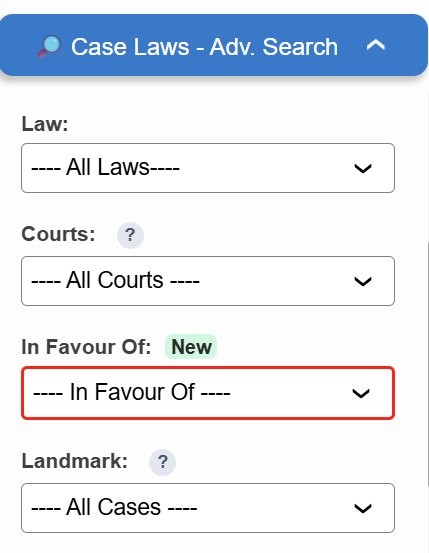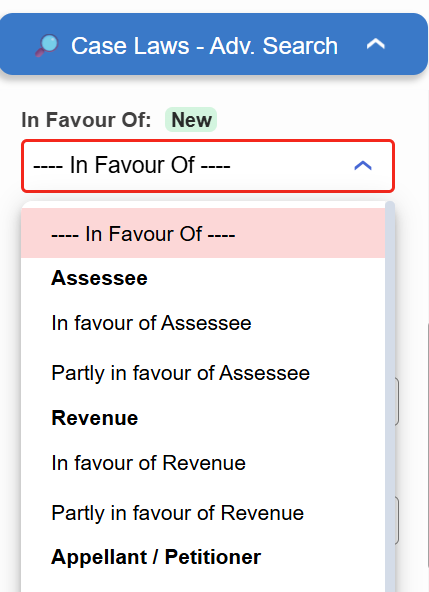Introducing the “In Favour Of” filter in Case Laws.
- ⚖️ Instantly identify judgments decided in favour of the Assessee, Revenue, or Appellant
- 🔍 Narrow down results with higher precision
Try it now in Case Laws →


Just a moment...
Introducing the “In Favour Of” filter in Case Laws.
Try it now in Case Laws →


Press 'Enter' to add multiple search terms. Rules for Better Search
No Folders have been created
Are you sure you want to delete "My most important" ?
NOTE:
Don't have an account? Register Here
<h1>Supreme Court rules on quashing charges: Focus on Dowry Prohibition Act</h1> The Supreme Court quashed the charge sheet under Section 493 IPC due to insufficient allegations to establish the offense but upheld the charges under ... Dowry - deceit - offences punishable Under Section 498A of the Indian Penal Code and Section 4 of the Dowry Prohibition Act, 1961 - commission of an offence - HELD THAT:- The offences for which the Appellants have been charged are infact offences against society and not private in nature. Such offences have serious impact upon society and continuance of trial of such cases is founded on the overriding effect of public interests in punishing persons for such serious offences. It is neither an offence arising out of commercial, financial, mercantile, partnership or such similar transactions or has any element of civil dispute thus it stands on a distinct footing. In such cases, settlement even if arrived at between the complainant and the Accused, the same cannot constitute a valid ground to quash the F.I.R. or the charge sheet - the High Court cannot be said to be unjustified in refusing to quash the charge sheet on the ground of compromise between the parties. Whether the allegations made in the F.I.R. constitute commission of an offence? - Section 493 of the Indian Penal Code and Section 3 read with Section 4 of the Dowry Prohibition Act - HELD THAT:- A plain reading of the Section goes to show that in order to constitute an offence under this Section, it has to be demonstrated that a man has deceitfully caused any woman, who is not lawfully married to him, to believe that she is lawfully married wife and thereby co-habit with him. In other words, the Accused must induce a woman, not lawfully married to him, to believe that she is married to him and as a result of such mis-representation, woman should believe that she was lawfully married to the man and thus there should be co-habitation or sexual intercourse - The essence of an offence Under Section 493 Indian Penal Code is, therefore, practice of deception by a man on a woman as a consequence of which the woman is led to believe that she is lawfully married to him although she is not and then make her cohabit with him. The ingredients to constitute an offence Under Section 493 Indian Penal Code are missing from the averments. The allegations do not even prima-facie, cull out any inducement of belief in the victim that she is lawfully married to the Appellant No. 1 and on account of this deceitful misstatement, the victim co-habited with the Accused. Since the essential ingredients to constitute an offence Under Section 493 Indian Penal Code are missing from the allegations made in the F.I.R., offence under the said Section can not be said to be made out against the Appellants - The High Court having failed to advert itself to the aforesaid aspects and to that extent, the judgment is not liable to be sustained. The essential ingredients of the offence Under Section 3/4 of the Dowry Prohibition Act are that the persons Accused should have made demand directly or indirectly from the parents or other relatives or guardians of a bride or a bridegroom as the case may be any dowry and/or abets the giving and taking of dowry - There being direct allegations of demand of Dowry in the First Information Report, the allegations prima-facie constitute a commission of an offence under the Dowry Prohibition Act and thus the charges leveled against the Appellants Under Section 3/4 of the said Act, are not liable to be quashed. The charge sheet insofar as Section 493 Indian Penal Code is concerned stands quashed - Appeal dismissed. Issues Involved:1. Whether the High Court was justified in refusing to quash the charge sheet on the ground of compromise between the parties.2. Whether the allegations made in the FIR constitute the commission of an offence under Section 493 of the Indian Penal Code.3. Whether the allegations made in the FIR constitute the commission of an offence under Sections 3/4 of the Dowry Prohibition Act.Issue-wise Detailed Analysis:1. Refusal to Quash the Charge Sheet on the Ground of Compromise:The High Court dismissed the petition filed by the Appellants under Section 482 of the CrPC, challenging the charge sheet against them. The High Court directed the accused to surrender and apply for bail, which would be considered in light of relevant legal precedents. The Supreme Court noted that while the offences under Section 493 IPC and Sections 3/4 of the Dowry Prohibition Act are non-compoundable, the High Court has the power under Section 482 CrPC to quash proceedings if it serves the ends of justice. However, the Court emphasized that such power should be exercised cautiously, particularly in cases involving serious offences with a significant societal impact. The Supreme Court concluded that the offences in question are against society and cannot be quashed merely on the ground of compromise between the parties.2. Allegations under Section 493 of the Indian Penal Code:Section 493 IPC pertains to cohabitation caused by a man deceitfully inducing a belief of lawful marriage. The Supreme Court emphasized that for an offence under this section to be constituted, it must be demonstrated that a man deceitfully caused a woman to believe she was lawfully married to him, leading to cohabitation or sexual intercourse. The Court found that the FIR did not contain allegations of any inducement or deceit leading the victim to believe she was lawfully married to the appellant. The allegations in the FIR merely stated that the appellant misled the victim by suggesting their marriage was finalized, which does not meet the criteria for Section 493 IPC. Consequently, the Supreme Court quashed the charge sheet insofar as it pertained to Section 493 IPC.3. Allegations under Sections 3/4 of the Dowry Prohibition Act:Section 3 of the Dowry Prohibition Act penalizes the giving, taking, or abetting the giving or taking of dowry, while Section 4 penalizes the demand for dowry. The FIR contained specific allegations that the appellants demanded Rs. 5 Lakhs in dowry, which the complainant could not fulfill. The Supreme Court noted that these allegations clearly constitute an offence under Sections 3/4 of the Dowry Prohibition Act. The Court held that the allegations in the FIR prima facie disclose the commission of a cognizable offence under these sections, and therefore, the charges under the Dowry Prohibition Act could not be quashed.Conclusion:The Supreme Court quashed the charge sheet under Section 493 IPC due to the lack of necessary allegations to constitute the offence. However, the Court upheld the charge sheet under Sections 3/4 of the Dowry Prohibition Act, as the allegations in the FIR prima facie disclosed the commission of a cognizable offence. The appeal was thus partly allowed, quashing the charge sheet under Section 493 IPC while dismissing the appeal concerning the charges under the Dowry Prohibition Act.